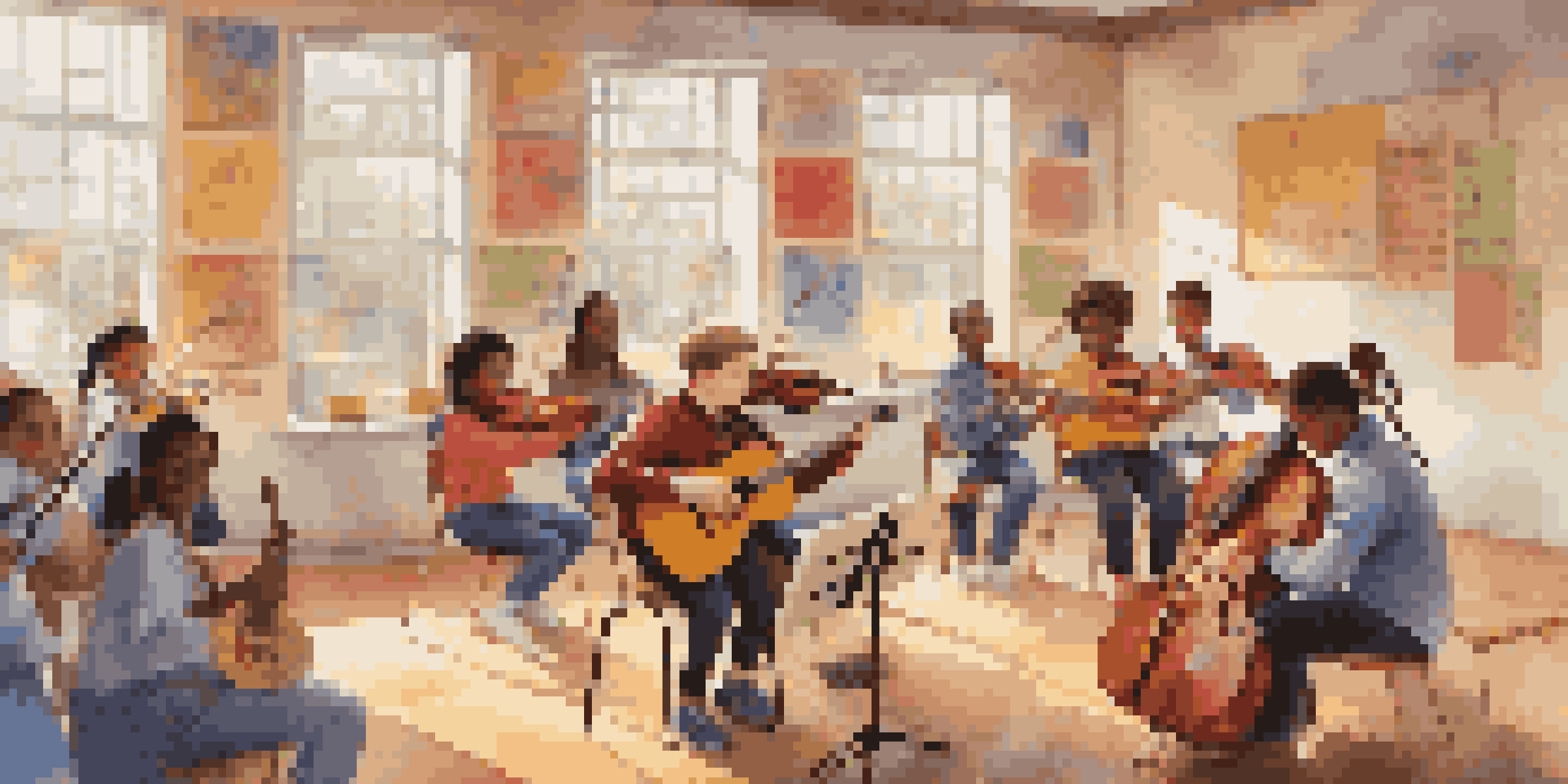The Role of Music Education in Fostering Empathy and Compassion

Understanding the Connection Between Music and Emotion
Music has an incredible power to evoke emotions, from joy to sadness. When students engage with music, they often find themselves connecting deeply with the feelings expressed in songs. This connection fosters an understanding of diverse emotional experiences, which is a crucial step toward developing empathy.
Music can change the world because it can change people.
For instance, listening to a poignant ballad can lead a student to reflect on personal experiences of loss or joy, helping them relate to others who have felt similarly. This emotional engagement builds a foundation for recognizing and understanding the emotions of their peers. Simply put, music serves as a bridge linking individual feelings to broader human experiences.
As students learn to interpret and express these emotions through music, they cultivate a greater awareness of how their actions affect others. This emotional intelligence is essential for nurturing compassion, as it encourages students to be more sensitive to the needs and feelings of those around them.
Collaborative Music Making Enhances Social Skills
Participating in group music activities, such as bands or choirs, naturally promotes teamwork and collaboration. Students must communicate effectively and listen to one another to create harmonious music, which mirrors the dynamics of healthy relationships in everyday life. This shared experience fosters a sense of community and belonging.

For example, when students work together to perform a piece, they learn to negotiate differences and support each other’s strengths. This process helps them appreciate the value of diverse perspectives, thus enhancing their capacity for empathy. They begin to realize that every member of the group contributes uniquely to the collective goal.
Music Enhances Emotional Connection
Engaging with music helps students connect deeply with emotions, fostering empathy and understanding of others' feelings.
Moreover, the challenges faced during rehearsals or performances teach resilience and patience. These qualities are fundamental in nurturing compassion, as students learn to stand by their peers, especially during tough times, reinforcing their understanding of mutual support and empathy.
Music Education Cultivates Cultural Awareness and Sensitivity
Through music education, students are exposed to a wide range of cultural traditions and expressions. Learning about different genres, instruments, and musical practices encourages an appreciation for diversity. This exploration not only broadens their musical horizons but also fosters respect and understanding for various cultures.
The beautiful thing about music is that it connects people. It tells a story and allows us to share our experiences.
For instance, studying world music allows students to delve into the stories and histories behind different musical forms. This understanding promotes a deeper connection to the cultural contexts from which these sounds arise, enriching their empathy toward people from different backgrounds. They learn that music can be a powerful tool for storytelling and cultural expression.
As students engage with music from various cultures, they also confront stereotypes and biases, leading to increased cultural sensitivity. This awareness is crucial in a globalized world where empathy and compassion are essential for peaceful coexistence. By understanding others through music, students become advocates for inclusivity and acceptance.
Emotional Expression Through Music Enhances Self-Awareness
Music education provides a safe space for students to explore and express their emotions. Whether through songwriting, improvisation, or performance, students can channel their feelings into creative outlets. This process not only helps them articulate their emotions but also fosters a deeper understanding of themselves.
For example, writing a song about personal experiences can be cathartic, allowing students to confront their feelings and reflect on their life situations. This self-reflection is a critical element in developing empathy for others, as it encourages students to recognize that everyone has their own struggles and stories. It becomes easier to connect with others when they understand their own emotional landscape.
Collaboration Builds Social Skills
Participating in group music activities promotes teamwork and resilience, essential for developing compassion among peers.
Moreover, this self-awareness extends beyond the individual. As students become more in tune with their emotions, they are better equipped to empathize with others who may be experiencing similar feelings. This connection lays the groundwork for compassion, as they learn to respond to others with kindness and understanding.
The Role of Music in Building Community and Connection
Music has a unique ability to bring people together, fostering connections that transcend barriers. In educational settings, music programs often create a sense of belonging among students. This communal aspect is vital for nurturing empathy, as it helps students feel more connected to one another.
When students participate in concerts or community music events, they share experiences that strengthen their bonds. These shared moments not only build friendships but also enhance their understanding of each other’s backgrounds and experiences. Such connections are instrumental in developing a compassionate outlook towards peers.
Furthermore, these community interactions often involve collaborative projects that extend beyond the classroom. By engaging with local musicians or participating in charity events, students learn the importance of using their musical talents to uplift others. This sense of shared purpose encourages a compassionate mindset, reinforcing the idea that music can be a force for good in the community.
Music Education as a Tool for Conflict Resolution
Music education offers innovative approaches to conflict resolution, teaching students how to navigate disagreements through collaboration. By working together to create music, students learn to value each other's input and perspectives, which is essential in resolving conflicts amicably. This skill is directly linked to fostering empathy.
For instance, during group projects, students may encounter differing opinions on musical choices. Instead of letting disagreements escalate, they practice compromise and active listening, which helps them understand where their peers are coming from. This practice not only resolves conflicts but also enhances their ability to empathize with others' viewpoints.
Music Fosters Cultural Sensitivity
Through exposure to diverse musical traditions, students cultivate respect and awareness for different cultures, enhancing empathy.
Moreover, the emotional aspects of music can serve as a calming influence during tense situations. By channeling their feelings through song or rhythm, students can express frustrations without resorting to confrontation. This emotional outlet promotes a culture of compassion and understanding, allowing them to approach conflicts with empathy.
Long-Term Benefits of Empathy Cultivated Through Music Education
The benefits of empathy cultivated through music education extend far beyond the classroom. As students develop their empathetic skills, they become more compassionate individuals in their communities and workplaces. This foundational experience in music education lays the groundwork for future relationships and social interactions.
Empathy nurtured through music can lead to positive societal impacts, including reduced bullying and increased cooperation among peers. Students who understand and respect each other's emotions are more likely to create supportive environments, fostering a culture of kindness. This ripple effect can significantly enhance the overall well-being of school communities.

Ultimately, the skills learned through music education, such as collaboration, emotional intelligence, and cultural awareness, contribute to shaping well-rounded individuals. As these students grow into adults, they carry with them a commitment to empathy and compassion, making the world a more understanding place for everyone.